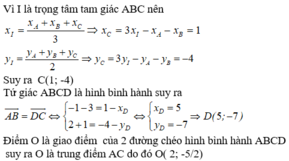Hãy nhập câu hỏi của bạn vào đây, nếu là tài khoản VIP, bạn sẽ được ưu tiên trả lời.

1.
\(\left\{{}\begin{matrix}x_I=\dfrac{x_A+x_B}{2}=-\dfrac{3}{2}\\y_I=\dfrac{y_A+y_B}{2}=1\end{matrix}\right.\) \(\Rightarrow I\left(-\dfrac{3}{2};1\right)\)
\(\left\{{}\begin{matrix}x_G=\dfrac{x_A+x_B+x_C}{3}=0\\y_G=\dfrac{y_A+y_B+y_C}{3}=0\end{matrix}\right.\) \(\Rightarrow G\left(0;0\right)\)
2.
\(\left\{{}\begin{matrix}\overrightarrow{CI}=\left(-\dfrac{9}{2};3\right)\\\overrightarrow{AG}=\left(-2;-3\right)\end{matrix}\right.\)
\(\Rightarrow\left\{{}\begin{matrix}CI=\sqrt{\left(-\dfrac{9}{2}\right)^2+3^2}=\dfrac{3\sqrt{13}}{2}\\AG=\sqrt{\left(-2\right)^2+\left(-3\right)^2}=\sqrt{13}\end{matrix}\right.\)
3.
Gọi \(D\left(x;y\right)\Rightarrow\left\{{}\begin{matrix}\overrightarrow{AB}=\left(-7;-4\right)\\\overrightarrow{DC}=\left(3-x;-2-y\right)\end{matrix}\right.\)
\(ABCD\) là hbh \(\Leftrightarrow\overrightarrow{AB}=\overrightarrow{DC}\)
\(\Leftrightarrow\left\{{}\begin{matrix}-7=3-x\\-4=-2-y\end{matrix}\right.\) \(\Rightarrow\left\{{}\begin{matrix}x=10\\y=2\end{matrix}\right.\)
\(\Rightarrow D\left(10;2\right)\)
4. Gọi \(H\left(x;y\right)\Rightarrow\left\{{}\begin{matrix}\overrightarrow{CH}=\left(x-3;y+2\right)\\\overrightarrow{AH}=\left(x-2;y-3\right)\\\overrightarrow{BC}=\left(8;-1\right)\end{matrix}\right.\)
H là trực tâm \(\Leftrightarrow\left\{{}\begin{matrix}AH\perp BC\\CH\perp AB\end{matrix}\right.\) \(\Leftrightarrow\left\{{}\begin{matrix}\overrightarrow{AH}.\overrightarrow{BC}=0\\\overrightarrow{CH}.\overrightarrow{AB}=0\end{matrix}\right.\)
\(\Leftrightarrow\left\{{}\begin{matrix}8\left(x-2\right)-1\left(y-3\right)=0\\-7\left(x-3\right)-4\left(y+2\right)=0\end{matrix}\right.\)
\(\Leftrightarrow\left\{{}\begin{matrix}8x-y=13\\-7x-4y=-13\end{matrix}\right.\) \(\Rightarrow H\left(\dfrac{5}{3};\dfrac{1}{3}\right)\)

I là trọng tâm của ΔABC
=>\(\left\{{}\begin{matrix}x_A+x_B+x_C=3\cdot x_I\\y_A+y_B+y_C=3\cdot y_I\end{matrix}\right.\)
=>\(\left\{{}\begin{matrix}3+\left(-1\right)+x_C=3\cdot1=3\\-1+2+y_C=3\cdot1=3\end{matrix}\right.\Leftrightarrow\left\{{}\begin{matrix}x_C=3-2=1\\y_C=3-1=2\end{matrix}\right.\)
Vậy: C(1;2)
Ta có: A(3;-1); B(-1;2); C(1;2); D(x;y)
=>\(\overrightarrow{AB}=\left(-4;3\right);\overrightarrow{DC}=\left(1-x;2-y\right)\)
ABCD là hình bình hành
=>\(\overrightarrow{AB}=\overrightarrow{DC}\)
=>\(\left\{{}\begin{matrix}1-x=-4\\2-y=3\end{matrix}\right.\Leftrightarrow\left\{{}\begin{matrix}x=5\\y=-1\end{matrix}\right.\)
Vậy: D(5;-1)
Tâm O của hình bình hành ABCD sẽ là trung điểm của AC
A(3;-1); C(1;2); O(x;y)
=>\(\left\{{}\begin{matrix}x=\dfrac{3+1}{2}=\dfrac{4}{2}=2\\y=\dfrac{-1+2}{2}=\dfrac{1}{2}\end{matrix}\right.\)
Áp dụng công thức trọng tâm:
\(\left\{{}\begin{matrix}x_A+x_B+x_C=3x_I\\y_A+y_B+y_C=3y_I\end{matrix}\right.\) \(\Rightarrow\left\{{}\begin{matrix}x_C=3x_I-\left(x_A+x_B\right)=1\\y_C=3y_I-\left(y_A+y_B\right)=2\end{matrix}\right.\)
\(\Rightarrow C\left(1;2\right)\)
Đặt tọa độ D là \(D\left(x;y\right)\Rightarrow\left\{{}\begin{matrix}\overrightarrow{AB}=\left(-4;3\right)\\\overrightarrow{DC}=\left(1-x;2-y\right)\end{matrix}\right.\)
ABCD là hình bình hành \(\Leftrightarrow\overrightarrow{AB}=\overrightarrow{DC}\)
\(\Rightarrow\left\{{}\begin{matrix}1-x=-4\\2-y=3\end{matrix}\right.\) \(\Rightarrow\left\{{}\begin{matrix}x=5\\y=-1\end{matrix}\right.\) \(\Rightarrow D\left(5;-1\right)\)
Tâm O hình bình hành là trung điểm đường chéo AC nên áp dụng công thức trung điểm:
\(\left\{{}\begin{matrix}x_O=\dfrac{x_A+x_C}{2}=2\\y_O=\dfrac{y_A+y_C}{2}=\dfrac{1}{2}\end{matrix}\right.\) \(\Rightarrow O\left(2;\dfrac{1}{2}\right)\)

a.
\(\left\{{}\begin{matrix}\overrightarrow{AB}=\left(-1;8\right)\\\overrightarrow{AC}=\left(3;6\right)\end{matrix}\right.\) mà \(\dfrac{-1}{3}\ne\dfrac{8}{6}\Rightarrow\overrightarrow{AB}\) và \(\overrightarrow{AC}\) không cùng phương hay A,B,C không thẳng hàng
\(\Rightarrow A,B,C\) là 3 đỉnh của 1 tam giác
b.
Theo công thức trung điểm: \(\left\{{}\begin{matrix}x_I=\dfrac{x_A+x_C}{2}=\dfrac{1+4}{2}=\dfrac{5}{2}\\y_I=\dfrac{y_A+y_C}{2}=\dfrac{-3+3}{2}=0\end{matrix}\right.\)
\(\Rightarrow C\left(\dfrac{5}{2};0\right)\)
Gọi G là trọng tâm tam giác, theo công thức trọng tâm:
\(\left\{{}\begin{matrix}x_G=\dfrac{x_A+x_B+x_C}{3}=\dfrac{1+0+4}{3}=\dfrac{5}{3}\\y_G=\dfrac{y_A+y_B+y_C}{3}=\dfrac{-3+5+3}{3}=\dfrac{5}{3}\\\end{matrix}\right.\) \(\Rightarrow G\left(\dfrac{5}{3};\dfrac{5}{3}\right)\)
c.
Gọi \(D\left(x;y\right)\Rightarrow\overrightarrow{DC}=\left(4-x;3-y\right)\)
ABCD là hình bình hành khi \(\overrightarrow{AB}=\overrightarrow{DC}\)
\(\Rightarrow\left\{{}\begin{matrix}4-x=-1\\3-y=8\end{matrix}\right.\) \(\Rightarrow\left\{{}\begin{matrix}x=5\\y=-5\end{matrix}\right.\)
\(\Rightarrow D\left(5;-5\right)\)

1.
a, Trọng Tâm G: \(\left\{{}\begin{matrix}x_G=\dfrac{x_A+x_B+x_C}{3}=\dfrac{8}{3}\\y_G=\dfrac{y_A+y_B+y_C}{3}=\dfrac{8}{3}\end{matrix}\right.\)
\(\Rightarrow G=\left(\dfrac{8}{3};\dfrac{8}{3}\right)\)
b, \(ABCD\) là hình bình hành \(\Leftrightarrow\vec{AB}=\vec{DC}\)
\(\Leftrightarrow\left\{{}\begin{matrix}x_B-x_A=x_C-x_D\\y_B-y_A=y_C-y_D\end{matrix}\right.\)
\(\Leftrightarrow\left\{{}\begin{matrix}x_D=0\\y_D=6\end{matrix}\right.\)
\(\Rightarrow D=\left(0;6\right)\)
c, \(\vec{AM}=3\vec{BC}\Leftrightarrow\left\{{}\begin{matrix}x_M=x_A+3\left(x_C-x_B\right)=-6\\y_M=y_A+3\left(y_C-y_B\right)=14\end{matrix}\right.\)
\(\Rightarrow M=\left(-6;14\right)\)






a) \(x_G=\dfrac{-3+1+\left(-1\right)}{3}=-1,\) \(y_G=\dfrac{-5+1+\left(-5\right)}{3}=-3\).
Vậy \(G\left(-1;-3\right)\).
Do điểm I thuộc trục hoành nên \(I\left(x,0\right)\).
Do điểm I thuộc đường thẳng BG nên \(\overrightarrow{BI}=k\overrightarrow{BG}\).
\(\overrightarrow{BI}\left(x-1;-1\right)\), \(\overrightarrow{BG}\left(-2;-4\right)\).
Suy ra \(\dfrac{x-1}{-2}=\dfrac{-1}{-4}\Leftrightarrow4\left(x-1\right)=-2\)\(\Leftrightarrow x=\dfrac{1}{2}\).
Vậy \(I\left(\dfrac{1}{2};0\right)\).
b) Ta tìm điểm I sao cho \(\overrightarrow{MA}+2\overrightarrow{MB}+3\overrightarrow{MC}=\overrightarrow{0}\).
Ta có: \(\overrightarrow{MA}+2\overrightarrow{MB}+3\overrightarrow{MC}=\left(\overrightarrow{MA}+\overrightarrow{MC}\right)+2\left(\overrightarrow{MB}+\overrightarrow{MC}\right)\)\(=2\overrightarrow{MQ}+4\overrightarrow{MN}\) (Q là trung điểm của AC và N là trung điểm của BC).
\(2\overrightarrow{MQ}+4\overrightarrow{MN}=2\left(\overrightarrow{MQ}+2\overrightarrow{MN}\right)=\overrightarrow{0}\)\(\Leftrightarrow\overrightarrow{MQ}+2\overrightarrow{MN}=\overrightarrow{0}\).
Vậy điểm M thuộc đoạn NQ sao cho MQ = 2MN.
Giả sử có điểm I sao cho \(\overrightarrow{IA}+2\overrightarrow{IB}+3\overrightarrow{IC}=2\overrightarrow{CB}\) \(\Leftrightarrow4\overrightarrow{IM}=2\overrightarrow{CB}\)\(\Leftrightarrow\overrightarrow{IM}=\dfrac{1}{2}\overrightarrow{CB}\).
Vậy điểm I được xác định sao cho \(\overrightarrow{IM}=\dfrac{1}{2}\overrightarrow{CB}\).
Cô ơi hình như cô chứng minh bài 2 sai ròii ấy ạ